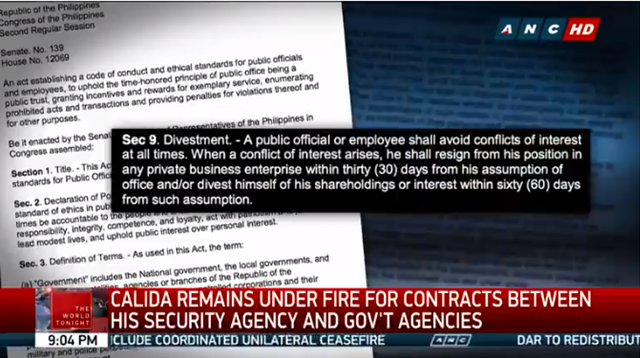Spotlight on SolGen Calida: The Legal Escape

Screengrab from news.ABS-CBN.com.
IN AN ironic twist of fate, it is now Solicitor General Jose Calida’s turn to stand in the spotlight of public scrutiny.
Retired businesswoman Jocelyn Acosta-Nisperos filed charges of graft, malversation and misconduct against Calida before the Office of the Ombudsman on May 10. The charges stemmed from a general information sheet showing his 60 percent ownership of Vigilant Investigative and Security Agency Inc (VISAI). The Securities and Exchange Commission (SEC) document also showed that his wife and three children own the remaining shares of the company which bagged PHP261.39 million worth of government contracts since Calida was appointed the republic’s lawyer in July 2016.
Acosta-Nisperos also raised other allegations: Calida’s “unconstitutional” quo warranto petition against former Chief Justice Maria Lourdes Sereno, his bias for the Marcos family and his “diversion” of PHP1.8 million worth of public funds to his alleged 22-year old mistress (“Sereno supporters sue Calida for graft, malversation, misconduct”).
Attention on the controversy peaked when the SolGen released a statement on May 28. Reports which merely re-stated parts of the complaint and of Calida’s response were mired in legal language, which missed the point in terms of clarifying the basis of the allegation.
Calida defended himself by saying that he had already resigned as provided by the Code of Conduct and Ethical Standards for Public Officials and Employees (RA 6713), pointing out that he did not need to divest himself of his personal ownership of VISAI, stressing that the election of his wife and children had been done by the stockholders. (see links for legal provisions below)
In Rappler’s Thought Leaders column on May 31, Marites Vitug debunked Calida’s argument by citing the implementing rules and regulations (IRR) of the same law. Under Rule IX of the IRR of RA 6713, it is explicitly written that, “…when a conflict of interest arises, an official has 60 days to divest his shares from the time he assumed office. Divestment is mandatory if the official is a substantial stockholder, even if [he has] resigned from his position.”
More important, Vitug pointed out, the provision also states that divestment should be done to a person “other than his spouse and relatives within the fourth civil degree of consanguinity or affinity.” With the shares of his company still exclusively owned by his family, there is a clear violation of the IRR (“Mr Calida, read the rules!”).
Violation of Constitution
In her news.ABS-CBN.com opinion column, Raissa Robles looked into the legality of Calida’s ownership of VISAI shares. Robles said that mere ownership of stock certificates by top government officials is prohibited by the constitution, citing Article VII, Section 13 of the Constitution. She breaks down the section, underscoring the language used, among them: “They shall not, during said tenure, directly or indirectly practice any other profession, participate in any business, or be financially interested…” (“Yes, Solicitor General Calida IS violating the Constitution. Here’s the proof”).
Calida argued that constitutional prohibitions on cabinet members are not applicable to him since he is not a member of the cabinet.
The Inquirer’s May 30 report, however debunked this, saying that the SolGen is “conferred Cabinet rank under the law” (“Solgen still owns security firm”).
Section 3 of RA 9417 (An Act to Strengthen the Office of the Solicitor General) states that “the Solicitor General shall have cabinet rank…”
Potential Conflict of Interest
On June 1, ANC’s The World Tonight aired a report that focused on the potential conflict of interest that Calida may have committed as a shareholder of VISAI. It was also aired in ABS-CBN’s primetime newscast TV Patrol on the same day.
According to Philippine Government Electronic Procurement System (PhilGEPS) data as cited by the ABS-CBN Investigative and Research Group, the company was awarded 14 government contracts worth PHP270-million from January 2016 to March 2018.
The report cited several lawmakers who questioned Calida’s integrity. Among them was former Rep. Neri Colmenares (Bayan Muna partylist) who floated the idea that a conflict of interest could arise for the solicitor general in the likelihood that the government files a case against VISAI (“Calida’s security agency: What the law says on conflict of interest”).
CMFR cheers media for sharing their research, which showed that VISAI’s contracts were secured from government agencies after Calida’s appointment.The report should have also checked whether VISAI had a record of government contracts before Calida took the government position.
Presidential Spokesperson Harry Roque has attributed criticisms against Calida as bitterness from the quo warranto complaint. But the media’s point by point presentation of counter-arguments shows up the statement to be a cheap evasion of the critical charge confronting Calida.
Did Calida commit a violation of code of conduct? As ethical conduct is not gauged only by legal measures, the media cited above have done well to point out the lack of ethical sense in Calida’s interpretation of the law. Coverage must continue to comb through legal arguments to translate its common sense meaning for the public.
Links:
Article VII, Sec. 13 of the 1987 Philippine Constitution
Section 9, Code of Conduct and Ethical Standards for Public Officials and Employees (RA 6713)
Rule IX of RA 6713’s Implementing Rules and Regulations
An Act to Strengthen the Office of the Solicitor General (RA 9417)
Leave a Reply